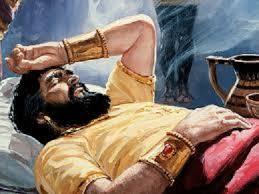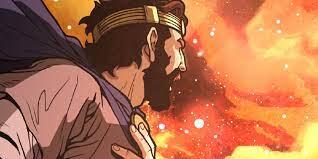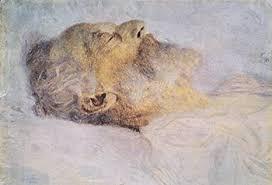As – Solomon’s Wish First Kings 3:1-15 and Second Chronicles 1:1-13
Solomon’s Wish
First Kings 3:1-15 and
Second Chronicles 1:1-13
Solomon’s wish DIG: What was wrong with Solomon marrying Pharaoh’s daughter? What was wrong with the Israelites and Solomon himself worshiping on the high places? Why were they worshiping there instead of the Temple? What was the extent of Solomon’s love for ADONAI? What was the result of Solomon delaying building the Temple? Why didn’t he just worship at Gibeon all the time? Why did God use dreams to communicate? What was Solomon’s agenda as king? Whose interests did he have at heart and why? What else did God promise Solomon? Why? Why did Solomon worship and throw a party?
REFLECT: What can Solomon teach us about joining spiritual forces with worldly people who are working against the Kingdom of God? Have you ever sensed God’s will in a dream? How does ADONAI’s word come to you? Do you need a special “appearance” from Him? Can you rely solely on His Word? Whose interests are close to your heart? How can you minister to them this week? What will it take? Do your own needs weigh heavily? Or are you concerned about everyone else so that you don’t take care of yourself? Who has your interests at heart? How can you identify with your spirit being willing but your flesh being weak?
With great privilege comes great responsibility.
If you could wish for anything in the world, what would it be? Some people wish they had different abilities – more brains, better looks, or stronger skills. Others wish for a change in their life circumstances. There is something they have that they wish they didn’t have, or something they don’t have that they wish they had. What would you wish be? Better yet, what if your biggest wish really would come true? And what if that person asking you what you wanted had infinite resources? That was the opportunity that ADONAI Elohim gave to King Solomon: Tell me! What I should give you?75
Wisdom had already played an important role in the narrative, guiding Solomon in his treatment of those who were a threat to him (to see the link click Ap – Putting the Kingdom First). It will now play an even greater role here. It is important to understand that Solomon’s reign has so often been divided into two fairly equal parts; an earlier period, in which he was obedient to YHVH and was consequently (along with Isra’el) blessed; and a later period, in which he was disobedient to Ha’Shem and was consequently (with Isra’el) judged by Him and the Kingdom was torn away (First Kings 11:11). This is undoubtedly very tidy, but it represents a massive over-simplification. There were signs of trouble right from the start.76
Solomon married Pharaoh’s daughter: Before we get to the wisdom of Solomon, we must first read First Kings 1:1-3. Solomon’s very first royal act was to marry the daughter of Pharaoh. This union was problematic. Since we have no reason to think that Pharaoh’s daughter had faith in the God of Isra’el, we can only conclude that Solomon was unequally yoked (see the commentary on Second Corinthians Bi – Do Not be Unequally Yoked with Unbelievers). Solomon formed an alliance with Pharaoh king of Egypt by marrying Pharaoh’s daughter (First Kings 3:1a). He was seduced by power as well as sex. Taken alone, this might be considered as nothing more than a historical note. But given its placement in the text, we may appropriately suggest that its function is more than informative. The note about the marriage is surely designed as a foreshadowing of Solomon’s future apostasy (see Bx – Solomon’s Wives). On two counts, Pharaoh must be considered a threat and a contrast to everything Israelite. First of all, Pharaoh embodied a concentration of imperial wealth and power, a center of commerce whereby the security of the state consists in trade and military power. As such, Egypt was a powerful contrast to the simple, covenantal faith Israelite.77
Dear Almighty Heavenly Father, So, I looked for You in the Sanctuary, to see Your power and Your glory. Since Your loving kindness is better than life, my lips will praise You. So I will bless You as long as I live. In Your name I lift up my hands. My soul is satisfied as with fat and oil, so my mouth praises You with joyful lips (Psalms 63:3-6). How wonderful it is to trust and to follow Your steadfast love! Life on this earth is short. Earthly pleasures are really only momentary. Living with our eyes focused on Your great love for all eternity is so very important.
How important it is to make a daily habit of turning our thoughts back to you all thru out the day. It is such a bonus to have Your Word which we can read before sleep and then meditate on your power and glory. When I remember You on my bed, I meditate on You through the night watches. For You have been my help, and in the shadow of Your wings I sing for joy. My soul clings to You – Your right hand upholds me (Psalms 63:7-9). Often, more than once daily, we feed our bodies. To keep our spiritual life healthy we need to also feed it more than weekly, more than once a day. Meditation on Your power and love is a special weapon which brings victory to our heart, no matter what the circumstances are. Drifting away can happen slowly and without notice. For this reason it is necessary for us to pay especially close attention to what we have heard, so that we do not drift away. (Hebrews 2:1). Being intentional about giving You our thoughts and time as first in our lives is so wise and brings peace and joy. Remembering Your love, our wise and powerful Heavenly Father, is truly a great gift and joy! You are Awesome! In your Holy Son’s name and power of resurrection. Amen
Secondly, Egypt is, of course, a name that resonates throughout the TaNaKh with negative connotations: oppressor, arch-enemy of old, and a source of temptation (Exodus Chapters 1-15). Deuteronomy, in particular, had warned against a return to Egypt (Deuteronomy 17:16) in terms of relations that were too close, and had explicitly forbidden intermarriage with foreigners, lest the Israelites be led into apostasy (see the commentary on Deuteronomy Ca – Warning Against Idolatry). Thus, as much as Solomon loved ADONAI, there were some ominous warning signs that his love was not wholehearted and the seeds of his downfall were already sown. This too is a warning for us – a warning not to try to advance our position by joining spiritual forces with worldly people who are working against the Kingdom of God.78
The author uses the queen’s arrival in Jerusalem as an opportunity to make a point about Solomon’s priorities. He brought her into the City of David, [where she lived] until he had finished building his own palace, the House of ADONAI (the Temple) and the wall around Yerushalayim (First Kings 3:1b). We find later in the book something that helps us understand what is written here. For in First Kings 6:38-7:1 we learn that Solomon spent almost twice as much time building his palace as he did building the Temple. This prepares us for later parts of the story. Indeed, we cannot but ask whether the author does not intend for us to see the influence of his foreign wife in this. For the question of divided loyalties has already been raised above, and this particular foreign wife, living in temporary accommodations while her new palace was being built, had a particular vested interest in the process of the building program.79
Misplaced worship: However, the people were still sacrificing on the high places (First Kings 3:2a). The word however, is intended to stop us in our tracks. Although conditions were outwardly good, there was something rotting beneath the surface. The people were still sacrificing on the high places. They were a constant sore point in Isra’el, and the prophets of God frequently spoke out against them. There were two basic problems: First, they detracted from the principle of a central Sanctuary, and secondly, since the worship at high places was a Canaanite custom, therefore syncretism (combining different beliefs) was not only a real danger, but an all-too-common occurrence. Even though the Temple had not yet been built, the LORD clearly instructed the Israelites that those cultic worship centers were to be destroyed when they entered the Promised Land (Numbers 33:52). Then they were to worship at a Sanctuary in the place appointed by Him (see Deuteronomy Ct – The Place to Worship ADONAI). There is, of course, nothing here to suggest that the people had already succumbed to temptation. The implication is that they do worship the Name, even if it was not in the ideal place. But the potential for disaster is clear enough, and in First Kings 11:33 we will learn of a people who eventually followed Solomon into sin (see Ca – A House Divided).80
The history of the Tabernacle: The latter part of the verse gives us the reason for the use of various high places for worship. Because no House (Temple) had yet been built for the name of ADONAI (First Kings 3:2b). Before Eli’s time, the Tabernacle had been as Shiloh; but with the Philistines’ capture of the ark, Shiloh lost its significance as the place of God’s presence among His people. Even after the ark was returned by the Philistines, it remained for years in the house of Abinadab (1 Sam 7:1), until David moved it to Jerusalem (see the commentary on the Life of David Cr – The Ark Brought to Zion) to a tent he had prepared for it. The Tabernacle next appeared at Nov (see the Life of David Av – David at Nov), where it remained until Sha’ul massacred the priests there (see the Life of David Bd – Sha’ul Kills the Priests of Nov). At some point after this event, it was moved to Gibeon, where it is mentioned in connection with Zadok’s high priestly ministry (First Chronicles 16:39-40). There were then, in effect, two Tabernacles during David’s reign. The one in Gibeon was without the ark; the one in Jerusalem had the ark but no trappings of the Tabernacle (Second Corinthians 1:3-5). This state of affairs matched that of the double priesthood of Zadok and Abithar.81
A man after David’s heart: Solomon loved ADONAI, living according to the regulations set forth by David his father (First Kings 3:3a). This is virtually the highest praise that any person could ever receive. In fact, Solomon is the only person in the entire Bible who is said to have loved ADONAI, in so many words. His heart was full of holy affections for the God of Abraham, Isaac, and Jacob. He adored YHVH and responded to Him emotionally. He felt a deep spiritual longing in his soul, a passionate yearning for a closer relationship with Him. But as much as he loved the LORD, it seems that Solomon’s love was not wholehearted. He married an Egyptian; he did not keep the Torah. Then we are bound to ask: what kind of “love” was this?
Except that he offered sacrifices and burned incense on the high places (First Kings 3:3). It seems that his loyalties were divided. And in a way the choice of the word love itself reflects that – at least within the context of the book of Kings. It is certainly a word that has been chosen carefully. And it is difficult to avoid the impression that its use here has quite a bit to do with the fact that it reappears twice in First Kings 11:1-2 in relation to Solomon’s other great “loves” – the foreign women, of whom Pharaoh’s daughter was one. The question here in First Kings 3:1-15 about the completeness of his love is compounded if we are aware of the end of his story and how fragile this “love” did indeed turn out to be. The lack of his wholeheartedness would become painfully obvious later in his life. The spirit is willing but the flesh is weak (Matthew 26:40-43). This would eventually lead not only to his own apostasy, but also to the apostasy of the nation itself (see Cz – The Divided Kingdom: The Rise of Idolatry).82
So while it is true that Solomon was a king after David’s own heart, a man who loved ADONAI, it is also true that he had a wandering heart that loved money, sex, and power – the very temptations that led to the downfall of Adonijah, Joab, and Shim’i (see Ap – Putting the Kingdom First). The warning signs of Solomon’s tragic downfall were present from the very beginning of his story, which is not just black and white, but colored by shades of gray.
In other words, Solomon was a lot like us. He loved the LORD, as every believer does. But he also had some other “loves” in his life – sinful passions that had the power to destroy his spiritual leadership. He did not love ADONAI his God with all his heart and soul and strength (Deuteronomy 6:4). While there is some truth to the view that Solomon’s life started out more positive spiritually, before ending up more negative, the deeper truth is that like every other believer, he was always just as much a sinner as he was a saint.83

ADONAI appears to Solomon: This is the first of two personal appearances of God to Solomon (for the other see Br – Solomon’s Choice). Here, Ha’Shem approves of Solomon’s attitude as expressed in the king’s prayer; in the latter passage YHVH approves of the Temple Solomon had built, but also warns him to continue to remain true to the LORD. That God had in such a remarkable way declared Himself willing to pour out His blessing on Solomon and his work made the king all the more responsible for his later apostasy. With great privilege comes great responsibility.84
Solomon’s prayer for wisdom: We are now in a better position to approach the story of Solomon’s request for wisdom. For it is the Solomon we have just met – a divided, conflicted, sinful Solomon, with only a very practical grasp of God’s dealings – who now comes to worship. One time the king went to Gibeon (five miles north of Jerusalem) to sacrifice because the tent that housed the Tabernacle was located there. Then Solomon spoke to all Isra’el – to the captains of thousands and of hundreds, to the judges and to every leader in all Isra’el, the heads of clans. Solomon and the whole community with him went to the high place at Gibeon, because in that place was God’s tent of meeting, which Moshe the servant of ADONAI had made in the desert. And the bronze altar crafted by Bezalel (see the commentary on Exodus Ew – The Appointment of Bezalel and Ohaliab) was in Gibeon in front of the Tabernacle. So Solomon offered a thousand burnt offerings on the altar and the whole leadership of Isra’el inquired of the LORD there. The assembly lasted all day and the people remained at Gibeon for the night, including Solomon. That night, ADONAI appeared to Solomon in a dream (First Kings 3:4-5a; Second Chronicles 1:2-3 and 5-6).
The dream consisted of three parts.
First, God appeared to Solomon and said to him, “Ask me! What I should give you” (First Kings 3:5b; Second Chronicles 1:7)? The LORD did not put any conditions on the king’s request, but simply invited him to ask for whatever he wished. This was an amazing offer of generosity in which YHVH was immediately and generously available to the king.
The second part of the dream was Solomon’s well-crafted response. Notice where Solomon began. He didn’t start with his request; he began with the past, with what YHVH had done. Solomon said to God, “You showed your servant David my father great kindness (see the commentary on Ruth Af – The Concept of Chesed), as he lived before you honestly and righteously, having an upright heart with you. You have continued this great kindness (Hebrew: chesed) to him by giving him a son to sit on his throne, and have made me king in his place (First Kings 3:6; Second Chronicles 1:8).
And now, turns from the past to the present circumstance, ADONAI my God, you have been faithful to your promise to David my father. For you have made me king over a people as numerous as the grains of dust on the earth (Genesis 13:16); but I am a mere child – I don’t know how to lead (First Kings 3:7; Second Chronicles 1:9). Solomon’s wise request was based on a proper knowledge of his own limitations. Like Moshe before him (Exodus 4:10) and Jeremiah after him (Jeremiah 1:6), Solomon was somewhat doubtful of his own abilities. When he called himself a mere child, he meant that he was inexperienced and thus dependent on YHVH to give him the help he needed.
Moreover your servant is among your people, whom you chose, a great people so numerous that they cannot be counted. He had used wisdom before in dealing with affairs of state, seemingly with great competence, yet now, he confessed that he didn’t know how to lead and the task seemed overwhelming. He knew how limited he was, but he also knew how unlimited God was, and so he prayed for divine wisdom. Therefore, give your servant a discerning heart (literally meaning “a listening heart” or “an obedient heart”), wisdom and knowledge, so that I will be able to lead Your people, and discern between good and evil – for who is equal to leading this great people of yours” (1 Kings 3:8-9; 2 Chron 1:10)? The fear of ADONAI is the beginning of wisdom (Job 28:28; Ps 111:10; Prov 15:33). Solomon apparently only just learned this. Because he has learned it, however, and has now placed himself in a humble and submissive position in relation to God, seeking the common good rather than simply his own, the blessings of God are now to follow.85
Solomon’s situation was unique: he alone inherited David’s throne, so only he could pray exactly this prayer. But this wise request is still an excellent example for us to follow. Unlike Solomon, “I am not the king,” writes one commentator, “but shouldn’t I pray like one?” Yes, we should pray like Solomon. With all due reverence, we should acknowledge our own limitations, openly admitting how weak we are in honoring our parents, serving our spouse, raising a child, loving a neighbor, leading a ministry, sharing the Gospel, or anything else that God calls us to do. Then, with confident faith, we should ask God for the wisdom we need to serve Him well in whatever He has called us to do. In ourselves, we are unequal to any of the tasks God has given us, but we can ask Him to give us a listening and obedient heart. We should not ask this for ourselves, primarily, but for the good of God’s people and the sake of His Kingdom.86
The third element was ADONAI’s answer. What Solomon had said in making this request pleased ADONAI. God said to him, “Because you have set your heart on this instead of asking long life, riches for yourself, or the death of those who hate you, but rather you asked for wisdom and knowledge for yourself, so that you would be able to administer justice over whom I made you king – I am doing what you requested. I am giving you a wise and understanding heart, so that there has never been anyone like you, nor will there ever again be anyone like you” (First Kings 3:10-12; Second Chronicles 1:11). He was so pleased with what Solomon asked that He granted his request. The king became what God promised: the wisest man who ever lived. This gift went beyond Solomon’s natural intellectual ability (which must have been exceptional), to give him the kind of spiritual insight that can only come from the LORD (Proverbs 2:6). To this day we can learn from the king’s wisdom by reading his wise sayings in the book of Proverbs, studying his wise philosophy of life in Ecclesiastes, and hearing his wisdom about love and romance from the Song of Solomon.
But I am also giving you what you didn’t ask for, riches and honor greater than that of any other king throughout your life. Thus, Solomon received the very gifts he had bypassed in his request for wisdom. In His sermon on the mount (see the commentary on The Life of Christ Cz – Introduction to the Sermon on the Mount) Yeshua echoed those same thoughts for us today: But first seek the Kingdom of God and His righteousness, and all these things will be given to you as well (Matthew 6:33). More than that, if you will live according to my ways, obeying my statutes (Hebrew: hachukkim, meaning to write into law permanently) and ordinances (Hebrew: hammishpatim, meaning a judgment of the court) like your father David, I will give you a long life, riches, wealth and honor such as no king before you has ever had; and no king after you will have as much” (First Kings 3:13-14; First Chronicles 1:12-13). ADONAI was careful to remind Solomon that his obedience to God’s covenant and his devotion to YHVH were the keys to his future blessings. It was not good enough that Solomon be obedient at the outset. He needed to make good choices along the way, the choice of listening and obeying, for it was in choosing obediently that Isra’el and its king would choose life (see the commentary on Deuteronomy Fq – Choose Life).
The way for us to follow Solomon’s wise counsel is to study the Scriptures, which are able to make us wise unto salvation through faith in Yeshua Messiah (Second Timothy 3:15), and to seek the wisdom of God in the Person of the Ruach Ha’Kodesh. For as wise as Solomon was, the Bible says that ADONAI is wiser still. This explains why, when Matthew speaks of the world-famous wisdom of Solomon, it goes without saying that something greater than Solomon is here (Matthew 12:42). And that something greater is Yeshua Messiah, the divine Son of God and the wisdom of God (First Corinthians 1:24).87
Then Solomon awoke – and he realized it had all been a dream. He came away from the high place at Gibeon, from in front of the Tabernacle and returned to Yerushalayim (see the history of the Tabernacle above). For David had brought up the ark of God from Kiriath -Jearim to the place he had prepared for it because he had pitched a tent for it in Jerusalem (Second Chronicles 1:4). There, Solomon sacrificed burnt offerings (see the commentary on Leviticus Ai – The Burnt Offering) and fellowship offerings (see the commentary on Leviticus Ak – Peace Offerings). He also made a feast for all his officials so that they might also rejoice in thanksgiving at the renewed manifestation of God’s grace toward Isra’el and the house of David (First Kings 3:15; Second Chronicles 1:13a).
Summary statement: Because Solomon’s reign is presented as an ideal for the post-exilic community, special note is taken of the times of joy and celebration in his kingdom. Every phrase here illustrates that David’s blessings continued under his son. Solomon the son of David grew stronger and he reigned over Isra’el; ADONAI his God was with him, making him greater and greater (Second Chronicles 1:1 and 13b).
The wisest thing we could ever do is to give our lives to Yeshua Messiah. The supreme wisdom of the Lord is available to us for the asking, wisdom for even the little things of everyday life. It may seem tempting to envy Solomon for the invitation he was given to ask for anything he wanted from ADONAI. But God is ready to grant us Solomon’s wish and give us a heart of wisdom (Psalm 90:12). Yeshua told us to simply ask and it would be given; everyone who asks will receive (Matthew 7:7-8). Do you need wisdom for work, for the future, for a broken relationship, for an obstacle in ministry, or for problems in your family? The Bible gives this promise to anyone who asks in faith: If any of you lacks wisdom, you should ask God, who gives generously to all without finding fault, and it will be given to you (James 1:5 NIV).88








 Firmeza en la fe:
Firmeza en la fe: El autor anima a sus lectores: Permanezca el amor fraternal (13:1). Amarnos revela al mundo que pertenecemos al Mesías, nos asegura nuestra verdadera identidad y deleita a ADONAI. Jesús dijo:
El autor anima a sus lectores: Permanezca el amor fraternal (13:1). Amarnos revela al mundo que pertenecemos al Mesías, nos asegura nuestra verdadera identidad y deleita a ADONAI. Jesús dijo:  Monte Sión
Monte Sión